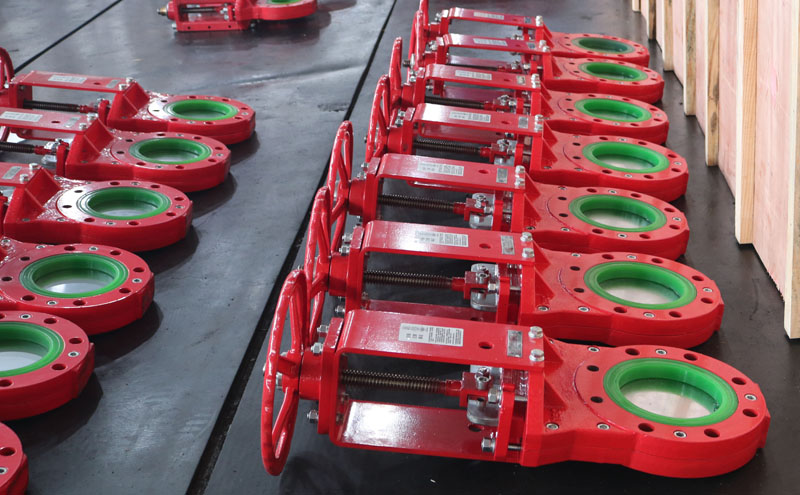Apa kuwi Katup Gerbang Geser
A katup gerbang geser(biasane diaranikatup gerbang pisoutawa linierkatup gerbang) ngontrol aliran nggunakake pelat geser utawa "pisau" sing obah tegak lurus karo pipa. Karakteristik utama:
- Operasi:Lading mudhun menyangaliran blok(nyegel ing kursi) utawa ngangkat supayalintasan kanthi bolongan lengkap.
- Desain:Ideal kanggo bubur, bubuk, lan media kental ing ngendi katup tradisional gagal.
- Segel:Ngrampungake operasi supaya ora ana gelembung udara kanthi nggunting barang-barang padat nganggo pinggiran bilahe.
—
Jinis-jinis Katup Gerbang Geser
1. Katup Gerbang Pisau Standar
- Pisau logam kanggo bubur abrasif (pertambangan, banyu limbah).
- Kursi sing awet (EPDM/NBR) kanggo panyegelan sing rapet.
2. Katup Gerbang Pisau Poliuretan (Katup Gerbang Pisau PU)
- Bahan Pisau:Pisau dilapisi poliuretan kanggo tahan abrasi sing ekstrem.
- Kasus Panggunaan:Ideal kanggo bubur lan tailing pertambangan sing korosif banget.
- Kauntungan:Umur 3x luwih dawa dibandhingake karo bilah logam sing digunakake ing media abrasif.
3. Katup Gerbang Liwat Saluran
- Gapura bisa ditarik maneh kanggo akses mlebu.
- Watesan aliran nol ing posisi mbukak.
—
Cara Kerja Katup Gerbang Geser: Langkah demi Langkah
1. Kahanan Terbuka:
– Gapura kasebut diangkat kanthi vertikal menyang kap mesin.
– Nggawe jalur aliran sing ora diwatesi (diameter pipa 100%).
2. Kahanan Tertutup:
– Bilahé nggeser mudhun, nèmpèl ing kursi.
– Gunting padatan kanggo nutup anti bocor.
3. Pilihan Aktuasi:
–Pandhuan: Rodha tangan utawa tuas.
–Otomatis: Aktuator pneumatik/listrik.

—
Kauntungan Utama Katup Gerbang Geser
1. Watesan Aliran Nol: Desain full-bore nyuda penurunan tekanan.
2. Tahan Abrasi: Unggul karo bubur, padatan, lan media korosif (utamaneKatup gerbang piso PU).
3. Penyegelan Bidirectional: Efektif kanggo aliran ing loro arah.
4. Gampang Dirawat: Desain prasaja tanpa mekanisme sing rumit.
5. Ringkas & Entheng: 50% luwih entheng tinimbang tradisionalkatup gerbang.
—
Aplikasi Industri
- Pertambangan: Kontrol tailing, bubur bijih (panggunaan utama kanggoKatup Gerbang Pisau Poliuretan).
- Limbah: Penanganan lumpur, pembuangan pasir.
- Pembangkit Listrik: Sistem transportasi awu terbang.
- Pangolahan Kimia: Cairan kental, transfer polimer.
- Pulp & Kertas: Kontrol bubur serat tinggi.
—
Milih Produsen/Supplier sing Bisa Dipercaya ing Tiongkok
Tiongkokndominasi produksi katup industri. Kriteria pemilihan utama:
1. Keahlian Materi:
– KonfirmasiKatup gerbang piso PUpara pemasok nggunakake poliuretan sing disertifikasi ISO.
– Validasi tingkatan logam (SS316, baja karbon).
2. Sertifikasi:ISO 9001, API 600, ATEX.
3. Kustomisasi:Panjaluk desain khusus (bahan pelapis, ukuran port).
4. Tes:Nuntut laporan uji hidrostatik/abrasi.
5. Logistik:Verifikasi fleksibilitas pengiriman global & MOQ.
> Tips Profesional:NdhuwurProdusen Tiongkoknyedhiyakake model CAD, sertifikasi DNV-GL, lan dhukungan teknis 24/7.
—
Napa Milih Katup Gerbang Pisau Poliuretan (PU)
- Tahan Abrasi: umur pakai 10x luwih dhuwur dibandhingake karo baja ing aplikasi bubur.
- Kekebalan Korosi: Tahan media asam/basa.
- Efisiensi Biaya: Ngurangi downtime lan biaya panggantos.
- Kinerja Penyegelan: Njaga integritas karo partikel.
—
Dudutan
Pangertencara kerja katup gerbang geser—utamane jinis khusus kayaKatup Gerbang Pisau Poliuretan—njamin kinerja optimal ing lingkungan industri sing atos. Kanggo aplikasi bubur abrasif,Katup gerbang piso PUnawakake daya tahan sing ora ana tandhingane. Kerjasama karo sing disertifikasiTiongkokpara produsen/para pemasokkanggo solusi sing hemat biaya lan berkualitas tinggi sing disesuaikan karo kabutuhan pertambangan, banyu limbah, lan pangolahan kimia.
Wektu kiriman: 02 Juni 2025






